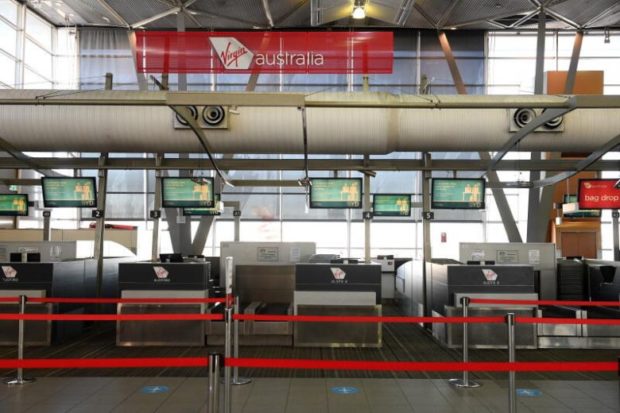Coronavirus: Australia’s curbs on travel abroad draw heavy criticism

A photo of the Virgin Australia check-in area at Sydney Domestic Airport on Aug 5, 2020. PHOTO: EPA-EFE via The Straits Times/Asia News Network
SYDNEY — Australia’s ban on its citizens and residents traveling overseas has come under heavy criticism and prompted concerns that people have been unable to travel for family emergencies or to reunite with spouses and children abroad.
Due to the Covid-19 pandemic, Australians are barred from traveling abroad unless they receive a special exemption from the federal government.
Permission is granted only for specific reasons such as urgent work or family purposes, or for medical or compassionate reasons. Foreign residents and airline crews are also exempt.
But some Australian citizens and residents say they have been unfairly denied exemptions or have had to wait for long periods before being allowed to leave the country.
A Sydney resident, Ms Astrid Magenau, 42, said delays in obtaining an exemption meant she was unable to be with her dying father in Germany. He died on July 18.
Article continues after this advertisementMs Magenau, a dual Australian-German citizen who has lived in Australia for 15 years, said her father’s funeral then had to be delayed while she obtained an international death certificate to seek an exemption to travel on compassionate grounds. She was expected to finally travel last Friday.
Article continues after this advertisement“I can understand that the Australian public wants to protect the general public’s health but, honestly, I do not see the risk I create for the Australian public if I leave the country,” Ms Magenau told The Sun-Herald.
“Australia for me is a welcoming country that loves immigrants, it’s multicultural, but since this travel ban has started… I feel very trapped here… It makes me feel like I am living in a prison.”
Numerous cases have emerged of people being unable to take up new jobs abroad or failing to reunite with partners. They include a Dutch-Australian couple who waited months before receiving permission to travel to their home in the Netherlands, where they are due to marry next month, and a German-Australian father and his two sons who applied five times before being allowed to rejoin the man’s wife and mother of the boys.
In many cases, people had turned to their local Members of Parliament, who have assisted to seek exemptions. An independent Sydney-based MP, Ms Zali Steggall, said she had received queries from around the country. She said she supported Australia’s closed border policy, which had helped to limit the spread of the virus, but the system should be simpler and more flexible.
“We can’t become a prison state,” she told ABC News. “People in relationships, or people with urgent family situations, where there’s family members sick or a death in the family, things that are really quite distressing – an absolute closed border policy can be very difficult.”
As of yesterday, Australia had recorded over 21,000 cases of Covid-19 and 295 deaths, after Victoria state, the epicenter of its renewed outbreak, reported 394 new cases and 17 more deaths. Victoria now has 14,659 cases and 210 deaths.
Between March 25, when the ban on overseas travel began, and June 30, more than 11,500 Australian citizens and residents were given exemptions to leave Australia and 3,300 were denied, according to The Sun Herald.
The Executive Traveller website said it had received more than 1,000 reports from people about their experience with the travel ban.
Some said they received exemptions within a day, or even within an hour, of applying.
Others said they had missed flights or repeatedly delayed their travel due to long delays and a failure to receive a response from the government.
When exemptions were granted, travelers were often notified within 72 hours of their departure.
The Australian Border Force has insisted that it tries to process exemptions as quickly as possible.
A spokesman told Executive Traveller that it has received high volumes of requests and prioritizes them by considering “the intended date of travel and any compelling or compassionate circumstances”.
An expert on human rights law, Dr Kate Ogg, from the Australian National University, said the ban on overseas travel appeared to breach the country’s international legal obligations.
Despite the government’s insistence that it was necessary for public health, Dr Ogg said less restrictive measures could have been introduced to prevent the spread of Covid-19, such as testing travelers before they leave and – as already occurs – requiring returning travelers to self-isolate.
“Prohibiting all international travel… is not the least intrusive method to achieve the objective of preventing or slowing the spread of Covid-19,” Dr Ogg wrote in an analysis published on the University of New South Wales website.
For more news about the novel coronavirus click here.
What you need to know about Coronavirus.
For more information on COVID-19, call the DOH Hotline: (02) 86517800 local 1149/1150.
The Inquirer Foundation supports our healthcare frontliners and is still accepting cash donations to be deposited at Banco de Oro (BDO) current account #007960018860 or donate through PayMaya using this link.